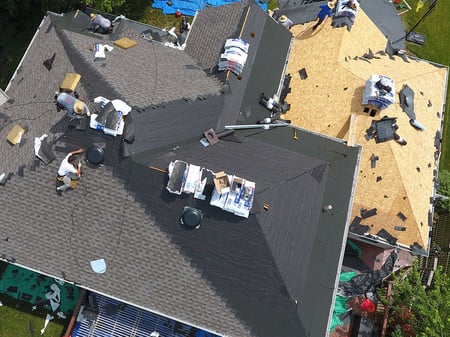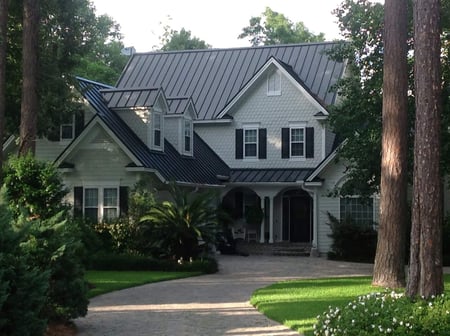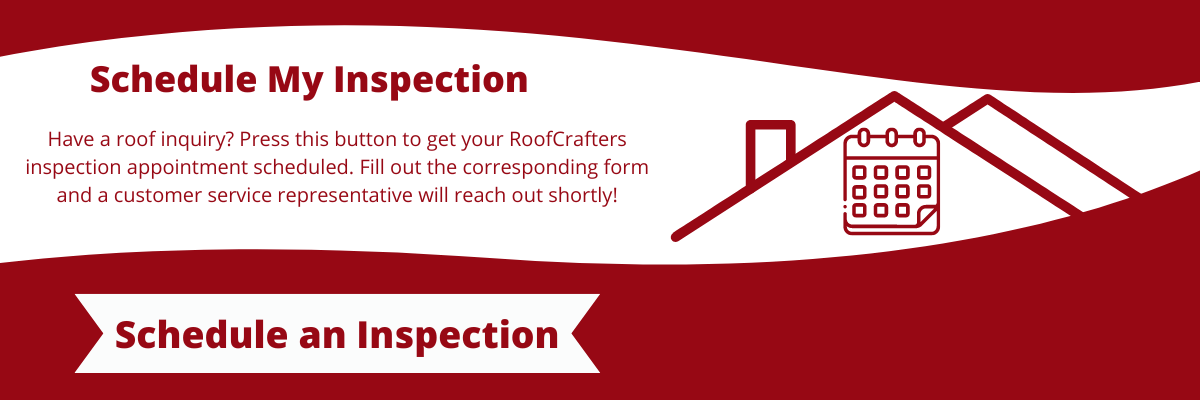Roof Replacement Payment Options
August , 2023 | 7 min. read

Let’s face it, home improvement projects can be daunting. They're not nearly quite as fun as buying a new sofa for your family room or finding the perfect addition to your antique collection. No, these bad boys are downright stressful, and roof replacements often cause a looming sense of anxiety in the “okay-I-just-had-my-inspection-what-happens-next?” period. Which, if you ask me, is completely understandable, because all types of questions arise such as How do I pay? Or Do I finance or pay at close? Or even, What the heck is roof flashing and why do I need it? The list goes on.
At RoofCrafters, we hear your concerns. Like a tale as old as time, (or however long it's been since Julia Roberts was in her prime and Beanie Babies® were all the rage), we’ve been replacing roofs for homeowners just like you, and we know that payment options are often a pain point when it comes to roofing projects. I mean, how could it not be? It’s hard to choose the right payment path, especially when you’re not a roofing expert yourself.
Well, my friend, you’re in luck, because over here, we are roofing experts, and we’ve had decades of time and experience in the industry that have allowed us to perfect an answer just for you. In just a few short moments, you’ll learn what exactly pay at close means in terms of your roofing project, other typical payment plans, and when homeowners shouldn’t pay at close. So, let’s get started!
Can I Pay at Close for My Roof Replacement?
"Pay at close" in the context of a roof replacement typically refers to a financial arrangement between the title company and the roofing contractor. This means that the homeowner will pay for the roof replacement upon the completion of the project.

In other words, the homeowner does not make an upfront payment for the roof replacement; instead, the payment is deferred until the transaction is finalized. This arrangement can be especially beneficial for homeowners who are looking to sell their property but may not have the immediate funds to cover the cost of the roof replacement before the sale.
*It's important to note that the specifics of a pay-at-close agreement can vary depending on the terms negotiated between the title company and the roofing contractor.*
Typically, such agreements might involve a lien or some form of security interest in the property until the payment is made. As with any financial arrangement, it's recommended to carefully read and understand the terms and conditions, and it might be wise to consult legal or financial professionals to ensure that the arrangement is fair and legally sound.
What Are the Different Ways to Pay?
Payment at close arrangements is not typical for all roofing projects. They are more commonly associated with certain situations, such as when a homeowner is selling their humble abode and needs a roof replacement as part of the sales process. As previously mentioned, the homeowner might not have the immediate funds to cover the cost of the roof replacement before selling the property, so they agree to pay for the roofing services at the time of the property's sale.

For regular roofing projects that are not tied to a property sale, the payment structure tends to be different. Typically, roofing contractors require some form of payment upfront or in stages as the project progresses. Common payment structures for regular roofing projects include:
Upfront Payment: Some contractors may require a percentage of the total project cost upfront before they start the work. This serves as a commitment from the homeowner and helps cover initial costs.
Progress Payments: For larger projects, payments might be divided into multiple stages based on project milestones. For example, a payment could be due after the removal of the old roof, another after the installation of underlayment, and so on.
Final Payment: The remaining balance is paid in full once the roofing project is completed to the homeowner's satisfaction.
Financing: Some contractors offer financing options that allow homeowners to spread the cost of the roofing project over time.
Insurance Claims: In cases where the roof replacement is covered by an insurance claim, payment is usually coordinated between the homeowner, the insurance company, and the roofing contractor.

It's important to discuss payment terms and expectations with your chosen roofing contractor before the project begins. Make sure you understand the payment schedule, any upfront costs, and any warranties or guarantees provided for the roofing work. Always get any payment agreement in writing to avoid misunderstandings later on.
When Shouldn't a Homeowner Pay at Close?
While pay-at-close arrangements can be beneficial in certain situations, there are scenarios where homeowners might want to reconsider this payment structure for their roofing project:
- Short-Term Ownership Plans: If you're planning to keep your property for an extended period after the roof replacement, it might be more cost-effective to pay for the roofing project upfront or through a traditional payment plan. Paying at close could result in higher overall costs due to potential interest or fees associated with the deferred payment.
- Uncertainty about Property Sale: If you're not certain about when your property will be sold or transferred, it might be difficult to plan for the deferred payment. A pay-at-close arrangement is contingent upon the property sale, and delays or changes in plans could affect the timing of payment.
- Control Over Contractor Selection: Paying at close could limit your choice of roofing contractors. Contractors might be more cautious about agreeing to such an arrangement, especially if they're unsure about the future sale of the property. This might reduce your options for finding the best contractor for the job.
- Legal and Financial Considerations: Pay-at-close arrangements can involve legal and financial complexities, such as placing a lien on the property until payment is made. It's important to fully understand the terms and implications of such an agreement, which might require legal counsel.

- Property Value: A roof replacement can significantly enhance a property's value and curb appeal. If you plan to sell the property soon after the roof replacement, you might want to ensure that the investment is reflected in the property's listing price, which could be more challenging with a pay-at-close arrangement.
- Flexibility: Traditional payment structures provide you with more control and flexibility over the timing of payments and the overall project. If you prefer to have a direct relationship with the contractor and the ability to monitor the project's progress, a different payment approach might be more suitable.
Should I Pay at Close for My Roof Replacement?
The concept of pay-at-close arrangements for roofing projects offers a unique financial solution that can have a positive outcome in certain scenarios. Primarily utilized when a homeowner intends to sell their property, paying at close allows for a deferred payment for the roof replacement until the property changes hands. While it can alleviate the immediate financial burden of a roofing project, there are important considerations to keep in mind.
As you now know, homeowners should carefully assess their circumstances, including their future property plans, financial capabilities, and the specifics of the roofing project. Paying at close may not be suitable for those who plan to remain in their property long-term, as it could result in higher costs due to deferred payment terms. Additionally, the potential limitations on contractor selection, legal ramifications, and impacts on property value should be thoroughly evaluated. Ultimately, the decision to opt for a pay-at-close arrangement should align with a homeowner's goals and preferences.
Being well-informed about the pros and cons, seeking professional advice when necessary, and ensuring a clear understanding of the contractual terms will help homeowners make the most appropriate choice for their roofing project's payment structure. If you’re in need of a roof replacement and are interested in learning more about your payment options, be sure to hit the “Schedule an Inspection” button down below, and one of our roofing professionals will happily illustrate how you can get the best bang for your buck on your upcoming roofing project!
My name is Cassie, and I’m the Content Manager here at RoofCrafters. I was born and raised in Chicago, Illinois, and made my way out to Florida post-college graduation. I’m incredibly passionate about writing and creating valuable content that helps others with the collaboration of my marketing team. When I’m not working, I enjoy shopping (a little too much), spending time at the beach, and reading!



